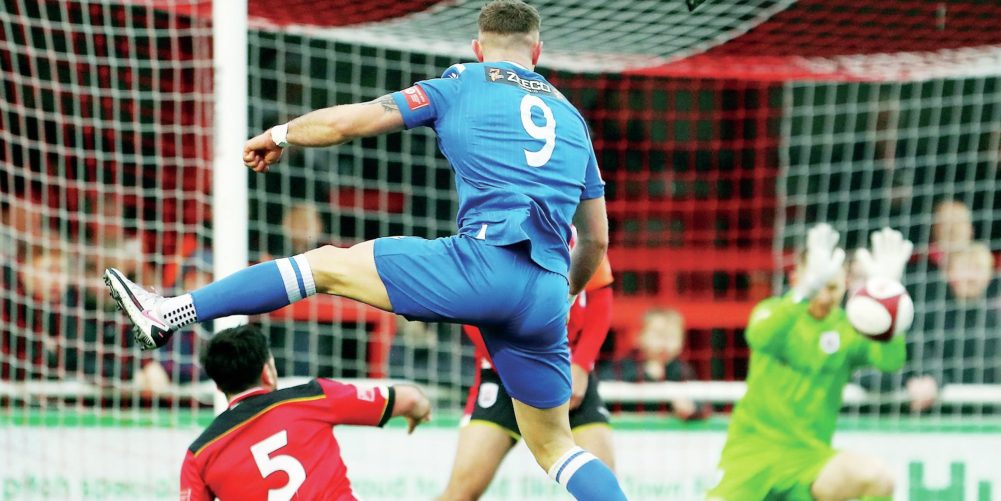
ONE word sums up life right now – uncertainty. With Kuenssberg, Peston and co fuelling mass hysteria, and scientists’ predictions erring on the Doomsday side of gloomy, its little wonder that Non-League fans are worried that a third consecutive season may not be completed.
As reported in last week’s NLP, ten days ago representatives of National League System leagues from Step 1 to 6 reviewed the impact of Plan B on our level of the game, concluding that the Covid advice issued to NLS clubs back in August don’t need to change – yet.
By now, every league will have written to its clubs, re-iterating that advice and the contingency plans in place in the event of an enforced ‘pause’ in fixtures after Christmas. Not all clubs will have shared current thinking and the direction of travel to their fans, so I’ll try to summarise both and explain why making things up as we go along is not an option.
Where are we trying to get to?
The primary objective of the NPL and our fellow leagues is to avoid a third consecutive season without promotion and relegation.
We can do this providing we can complete 75% of fixtures, because the FA council has approved a proposal to be able to finalise tables, promote and relegate once this milestone is reached. Most NPL clubs will have played half their games just after Christmas. At Steps 5-6, thanks to earlier exits from the cups, clubs have played even more and are ever closer to hitting the 75% target.
Contrary to the opinions of some NLP correspondents, you can’t throw the rulebook out of the window mid-season. Doing so risks legal challenge from clubs that would succeed because proving failure to apply the rules is the fastest route to winning any appeal.
Leagues’ second priority is to balance player welfare with the financial welfare of member clubs. The dilemma is that prioritising the former over the latter could have disastrous consequences for our clubs. Money isn’t the most important thing to clubs, but life can be very tedious without it.
Whilst only government can mandate vaccinations, clubs are best placed to ensure their players are triple jabbed. A quarter of EFL players are said to be un-vaccinated by choice; we don’t know what the figure is across Non-League but it’s unlikely to be significantly less. Clubs could, for example, designate refusal to be vaccinated a disciplinary offence punished by a fine. Some Bundesliga clubs are even cutting the wages of players who refuse to be vaccinated.
Current club guidance
Plan B’s restrictions do not directly impact us. There are currently no capacity limits, travel restrictions (other than to or from offshore clubs), or hospitality, so we can continue to fulfil fixtures so that we reach 75% of fixtures played, as soon as possible. Currently we ask clubs to:
● Minimise close contacts in and around changing rooms, travel, dugouts etc.
● Ensure players are not near each other for long in changing rooms, tunnel area or on a coach.
● Encourage players to travel in ones or twos and not travel in a car full.
● Require every player to carry out a PCR or lateral flow test before attending the stadium.
● Include either triple vaccinations and/or lateral flow tests in their Code of Conduct with appropriate penalties for non-compliance.
The criteria for postponing a League game applies across Steps 1-6 and is as follows:
● Clubs must have fewer than 13 players (including any additional goalkeepers) available who are not ineligible due to Covid-19 (as per FA Cup Competition Rule 34).
● Clubs must provide evidence of players testing positive for Covid-19 to the League as evidence to substantiate postponement request.
● Evidence is defined as PCR test results or a positive Lateral Flow Test from NHS, uploaded to and confirmation received back from NHS. ●Postponement requests (including all relevant evidence) must be submitted 6+ hours before kick-off.
● Requests will only be considered if all criteria above are met.
● The League’s decision regarding Covid-19 related postponements is final.
Clubs cannot call off any game, even if their opponents agree. Only the league can do this. Breaches of this, and other protocols will result in clubs being charged and risking heavy sanction.
What happens next?
We don’t need Dr Chris Whitty to remind us that tougher restrictions are likely after Christmas.
In the event of a so-called circuit breaker being forced on us, we need to complete as many fixtures as we can, as quickly as we can, to render our contingency plans redundant. Inevitably, some clubs will seek to take advantage of tighter rules. Those at risk of relegation would benefit from another curtailment, but clubs challenging for promotion would miss out. Nobody wants that.
If government forces fixtures to be paused, it is highly unlikely that clubs will receive meaningful financial support. We therefore need to keep playing fixtures until restrictions dictate otherwise.
The big question is whether Boris Johnson follows the Welsh or Scottish models when it comes to sporting events, and whether any distinction is made between elite (everything down to Step 2) and non-elite (Step 3 downwards) sport.
In some respects, the Welsh assembly’s policy of banning spectators from all sports makes the decision for us. Without furlough, our clubs cannot absorb wage bill or other operating costs for longer than a fortnight) without revenue via turnstiles, food and beverage income.
The Scottish model of capping fans at 500 is more problematic. For example, in the NPL, we have six or seven clubs regularly attracting attendances above 500.
We don’t know what grants would be available to defray costs during any period without games, and for how long monies made available would cover clubs’ costs.
It is unlikely that furlough would be re-introduced, and with the UK hospitality industry expected to survive on a grant of £6,000 per premises, it’s even more unlikely that the financial support made available will go anywhere near covering costs should any pause exceed a month at the outside. The average weekly wage bill at Step 3 is in the region of £5,000-£10,000, with Step 4 wage bills averaging £3,000 -£7,000.
The biggest ‘unknown’ is the severity of the Omicron variant. In theory, triple-vaccination should reduce the severity of catching the virus, but unvaccinated players pose a big risk to nonleague clubs being able to play fixtures.
Contingency plans – a reminder
So, what happens if fixtures are suspended for a longer period? As announced back in August, if a division cannot complete 100% of its fixtures, league tables can be finalised where a division has completed at least 75% of its fixtures.
Where this is achieved, final league standings would be determined by using unweighted Points Per Game and promotion and relegation would take place as per National League System regulations.
The FA Alliance or Leagues Committees would decide whether play-offs would take place, or the top two clubs are promoted instead depending on the time available.
The second contingency was designed to apply if this season could not commence before the end of October.
An alternate competition would be introduced based on either division remaining intact or split in half, with clubs in each half playing each other home and away. This approach is now redundant.
The third contingency would apply if a division cannot complete 75% of its fixtures, and there is insufficient time for an Alternate Competition to be completed. In this scenario a supplementary competition (which could be extended beyond the end of the traditional season), would be implemented.
If a supplementary competition is required, results from completed fixtures in the 2021-22 season would be utilised to avoid clubs playing opponents more than twice in the season and ensure there is enough data to decide final placings. The two FA Committees would also deci de whether pro- motion and relegation can occur.
Although the decision of which approach is adopted is the responsibility of the FA Alliance (for Steps 1-4) and Leagues Committees (for Steps 5-6), each division’s individual circumstances would be considered when determining which contingency plans applies.
So, all divisions are treated fairly and consistently. Both commit- tees’ views are currently aligned, so I would hope that a consistent approach is adopted across the NLS.
The objective remains to achieve promotion and relegation whilst maintaining the integrity and stability of the NLS.
What happens next?
Of course, given the unpredictable nature of the Covid-19 pandemic, circumstances may yet dictate that none of these approaches is workable.
You can’t cover every eventuality. If so, the FA committees would decide what course of action to taken.
It is impossible to rule out another curtailment completely, but my League and FA colleagues are fully focussed on ensuring that it doesn’t happen.
It’s not easy second-guessing what this government is going to do next. In fact, I’m not sure they know either.























